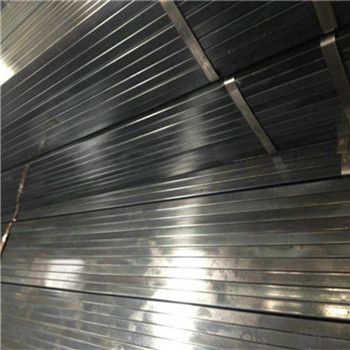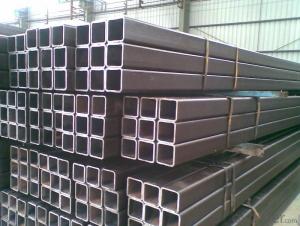GB/6278, ASTM High Quality Hollow Section with Best Price
- Loading Port:
- Tianjin
- Payment Terms:
- TT or LC
- Min Order Qty:
- 20 m.t.
- Supply Capability:
- 15000 m.t./month
OKorder Service Pledge
OKorder Financial Service
You Might Also Like
1、Structure of GB/6278, ASTM High Quality Hollow Section with Best Price:
ERW steel pipe is electric resistance welding, the abbreviation for ERW for transporting oil and natural gas vapor liquid objects, can meet the requirements of high and low pressure, the transport in the world with pipe sector accounted for a pivotal position.
2、Main Features of GB/6278, ASTM High Quality Hollow Section with Best Price:
• High manufacturing accuracy
• High strength
• Good visual effect
• Reasonable price
• Small inertia resistance
• Strong heat dissipation ability
3、GB/6278, ASTM High Quality Hollow Section with Best Price Specification:
Standard | GB, DIN, ASTM ASTM A106-2006, ASTM A53-2007 |
Grade | 10#-45#, 16Mn 10#, 20#, 45#, 16Mn |
Thickness | 1 - 33 mm |
Section Shape | Round |
Outer Diameter | 21 - 610mm |
Place of Origin | Tianjin, China (Mainland) |
Secondary Or Not | Non-secondary |
Application | Hydraulic Pipe |
Technique | Cold Drawn |
Certification | API |
Surface Treatment | factory state or painted black |
Special Pipe | API Pipe |
Alloy Or Not | Non-alloy |
Length | 5-12M |
Outer Diameter | 21.3-610mm |
Grade | 20#, 45#, Q345, API J55, API K55, API L80, API N80, API P110, A53B |
Standard | ASME, ASTM |
1) Material:20#(ASTM A 106/A53 GRB.API5LGRB,GB),45#,16Mn,10#.
2) Specification range:OD:21.3-610mm,WT:6-70mm,length:6-12m or according to the requirement of clients.
3) Excutive standards:GB,ASME API5L.ASTM A 106/A53,Despite of the above standards,we can also supply seamless steel pipe with standard of DIN,JIS,and so on,and also develop new products according to the requirements of our clients!
4) Surface:black lacquered,varnish coating or galvanized.
5) Ends:Beveled or square cut,plastic capped,painted.
6) Packing:bundles wrapped with strong steel strip,seaworthy packing.
4、Packaging & Delivery
Packaging Details: | seaworthy package,bundles wrapped with strong steel strip |
Delivery Detail: | 15-30days after received 30%TT |
5、FAQ of GB/6278, ASTM High Quality Hollow Section with Best Price:
①How is the quality of your products?
Our products are manufactured strictly according to national and internaional standard, and we take a test
on every pipe before delivered out. If you want see our quality certifications and all kinds of testing report, please just ask us for it.
Guaranteed: If products’ quality don’t accord to discription as we give or the promise before you place order, we promise 100% refund.
②How about price?
Yes, we are factory and be able to give you lowest price below market one, and we have a policy that “ for saving time and absolutely honest business attitude, we quote as lowest as possible for any customer, and discount can be given according to quantity”,if you like bargain and factory price is not low enough as you think, just don’t waste your time.Please trust the quotation we would give you, it is professional one.
③Why should you chose us?
Chose happens because of quality, then price, We can give you both.Additionally, we can also offer professional products inquiry, products knowledge train(for agents), smooth goods delivery, exellent customer solution proposals.Our service formula: good quality+good price+good service=customer’s trust
SGS test is available, customer inspection before shipping is welcome, third party inspection is no problem.
6.Images

- Q:How are steel pipes inspected for compliance with industry standards?
- Steel pipes are inspected for compliance with industry standards through various methods such as visual inspection, dimensional checks, non-destructive testing, and mechanical testing. Visual inspection involves examining the pipes for any visible defects or imperfections. Dimensional checks ensure that the pipes meet the required measurements and tolerances. Non-destructive testing techniques like ultrasonic testing, magnetic particle inspection, or radiography are used to detect any internal or surface defects. Mechanical testing involves conducting tests to verify the mechanical properties such as tensile strength, yield strength, and hardness of the pipes. These inspections ensure that the steel pipes meet the required industry standards and are safe for use.
- Q:Are steel pipes suitable for food processing facilities?
- Yes, steel pipes are suitable for food processing facilities. Steel is a durable and hygienic material that is resistant to corrosion, making it ideal for transporting food products and maintaining their quality and safety. Additionally, steel pipes are easy to clean and disinfect, further ensuring sanitation standards in food processing facilities.
- Q:How do you calculate the stress in a steel pipe?
- To calculate the stress in a steel pipe, you need to consider the material properties of the steel and the external forces acting on the pipe. The stress in a pipe is typically calculated using the formula: Stress = Force / Area First, you need to determine the force acting on the pipe. This could be due to external loads such as pressure, weight, or mechanical forces. You can calculate the force by multiplying the pressure or weight by the surface area on which it acts. For example, if the pipe is subjected to an internal pressure, you can calculate the force using the formula: Force = Pressure x Area Next, you need to determine the cross-sectional area of the pipe. The cross-sectional area of a circular pipe can be calculated using the formula: Area = π x (Diameter / 2)^2 Once you have determined the force and the area, you can calculate the stress by dividing the force by the area. This will give you the stress value in units such as pounds per square inch (psi) or newtons per square meter (Pa). It is important to note that the stress calculation assumes that the pipe is in a state of equilibrium and that the material properties of the steel are known. The material properties, such as yield strength and ultimate tensile strength, are used to ensure that the stress calculated does not exceed the maximum capacity of the steel.
- Q:Are steel pipes suitable for use in pharmaceutical industries?
- Yes, steel pipes are suitable for use in pharmaceutical industries. They are commonly used in pharmaceutical manufacturing processes as they offer excellent corrosion resistance, durability, and cleanliness. Additionally, steel pipes can withstand high pressure and temperature conditions required for sterilization and the transportation of various pharmaceutical liquids and gases.
- Q:How long is the seamless tube?
- Welded pipe is generally 6912 meters fixed length, seamless pipe on the market in general non fixed foot, but usually more than 6 meters
- Q:RC is it welded steel pipe or galvanized steel pipe?
- Common pipelines in construction are as follows:SC: welded steel pipeTC: wire tubes, thin steel tubesPC: rigid plastic pipesCT: cable trayCP: metal hoseSR: steel grooveRC: water gas pipe
- Q:What does "SC50" steel pipe mean in civil engineering?
- Welded steel pipe refers to the use of steel or steel plate bending deformation into a round, square and other shapes after welding into the surface of the joint of the steel pipe. The blank used in welded steel pipe is steel or strip steel.
- Q:Are steel pipes suitable for potable water applications?
- Yes, steel pipes are suitable for potable water applications. Steel pipes are commonly used for transporting water in various industries and municipal water systems. They are known for their durability, strength, and resistance to corrosion, making them a reliable choice for potable water systems. Steel pipes also have the advantage of being able to withstand high pressure and temperature conditions, making them suitable for both hot and cold water applications. Additionally, steel pipes can be easily welded, ensuring leak-free connections. However, it is important to note that the quality of the steel used and proper maintenance are crucial factors in ensuring the safety and suitability of steel pipes for potable water applications. Regular inspection and maintenance should be done to prevent corrosion and ensure the integrity of the pipes.
- Q:How are steel pipes protected against soil movement or settlement?
- Steel pipes can be protected against soil movement or settlement through various methods. One common method is to use protective coatings on the pipes. These coatings act as a barrier between the steel and the soil, preventing direct contact and reducing the risk of corrosion. Some commonly used coatings include epoxy, polyethylene, and zinc. Another method is to use cathodic protection. This involves the installation of sacrificial anodes along the pipeline. These anodes corrode instead of the steel pipes, protecting them from damage caused by soil movement or settlement. Furthermore, proper design and installation techniques can also help protect steel pipes against soil movement or settlement. For instance, engineers may consider factors such as soil composition, slope stability, and potential for ground movement when designing the pipeline route. Additionally, proper trenching and bedding techniques can help ensure that the pipe is adequately supported and protected against settlement. Regular inspection and maintenance are also crucial for protecting steel pipes against soil movement or settlement. Monitoring the condition of the pipeline, including the protective coatings and cathodic protection systems, can help identify any potential issues and allow for timely repairs or replacements. Overall, a combination of protective coatings, cathodic protection, proper design and installation techniques, and regular maintenance can effectively protect steel pipes against soil movement or settlement.
- Q:Are steel pipes fire-resistant?
- Indeed, steel pipes possess fire-resistant qualities. Being a non-combustible substance, steel does not ignite or aid in the propagation of flames. Steel pipes exhibit elevated melting points and can endure extreme temperatures, rendering them exceptionally fire-resistant. Consequently, they find widespread utilization in critical areas necessitating fire safety measures, including fire sprinkler systems, fire hydrant systems, and fire-resistant architectural frameworks. Moreover, the fire resistance capabilities of steel pipes are reinforced by their renowned robustness and resilience.
1. Manufacturer Overview |
|
|---|---|
| Location | |
| Year Established | |
| Annual Output Value | |
| Main Markets | |
| Company Certifications | |
2. Manufacturer Certificates |
|
|---|---|
| a) Certification Name | |
| Range | |
| Reference | |
| Validity Period | |
3. Manufacturer Capability |
|
|---|---|
| a)Trade Capacity | |
| Nearest Port | |
| Export Percentage | |
| No.of Employees in Trade Department | |
| Language Spoken: | |
| b)Factory Information | |
| Factory Size: | |
| No. of Production Lines | |
| Contract Manufacturing | |
| Product Price Range | |
Send your message to us
GB/6278, ASTM High Quality Hollow Section with Best Price
- Loading Port:
- Tianjin
- Payment Terms:
- TT or LC
- Min Order Qty:
- 20 m.t.
- Supply Capability:
- 15000 m.t./month
OKorder Service Pledge
OKorder Financial Service
Similar products
New products
Hot products
Related keywords






























